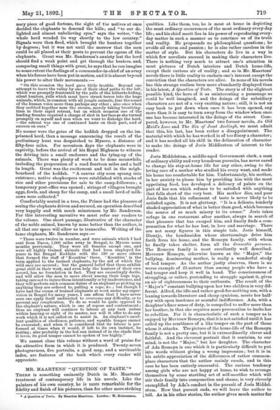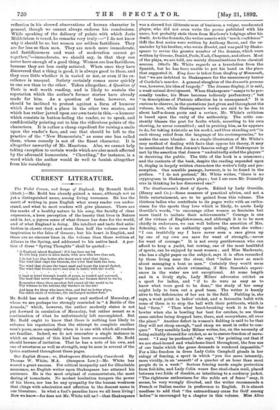MR. MAARTENS' "QUESTION OF TASTE."* THERE is something eminently Dutch
in Mr. Martens' treatment of contemporary life in his novels. Like the painters of his own country, he is more remarkable for the fidelity and finish of his pictures, than for other more striking * 4 Question of Teats. By Maarten Martens. London : W. Heinemann. qualities. Like them, too, he is most at home in depicting the most ordinary occurrences of the most ordinary every-day life; and his chief merit lies in his power of reproducing every- day matter in such a manner as to convince us of its truth and reality. He propounds no philosophical questions ; he
avoids all storm and passion ; he is also rather careless in the matter of style. But his characters do live in a way in
which few novelists succeed in making their characters live. There is nothing very much to attract one's attention in most pictures of Dutch interiors and Dutch home-life, except their curious air of reality ; and so in Mr. Maartens' novels there is little reality to enchain one's interest except the conviction that the characters are alive. In none of his novels has this strange realism been more abundantly displayed than in his latest, A Question of Taste. The story is of the slightest possible kind, the hero of it as uninteresting a personage as could be well imagined, and the doings of the subsidiary characters are not of a very exciting nature ; still, it is not an easy book to put down when once it has been opened, any more than it is easy to turn away from the window when once one has become interested in the doings of the street. Com- pared, however, to Mr. Maartens' two former novels, An Old Maid's Love and The Sin of host Avelingh, we must admit that this, his last, has been rather a disappointment. The material with which he has worked is of too flimsy a character; and it has needed all his skill in the delineation of character to make the doings of Joris Middlestum of interest to the reader.
Joris Middelstum, a middle-aged Government clerk, a man of ordinary ability and very humdrum pursuits, has never cared to change his stay-at-home life for any other, owing to the loving care of a mother who studied his every want, and made his home too comfortable for him. Unfortunately, his mother, in her anxiety to please him by providing him with the most appetising food, has developed a delicacy of palate on the part of her son which refuses to be satisfied, with anything that falls short of the very best. His mother dies, and poor Joris finds that his refinement of taste is never likely to be satisfied again. It is not gluttony. "It is a delicate, tenderly
shaded appreciation of what is better than good, which becomes the source of so much misery to its owner." Joris takes refage in one restaurant after another, always in search of that pleasure that has escaped him, and finally finds a com- pensation for what he has lost, in love and marriage. There are not many figures in this simple tale. Joris himself, Dientje, the handmaiden whose shortcomings drive him forth from his home, and the Romeyn family, with whom he finally takes shelter, form all the dramatis personz. The Romeyn family is most excellently well described. Mevrouw Romeyn, otherwise known as the "Major," the bullying, domineering mother, is really a wonderful study of bad temper. As the author justly observes, there is no worse example of ill-nature than among people who have a bad temper and keep it well in hand. The consciousness of struggling, or rather, pretending to struggle against it, gives an air of righteousness to their outbursts. The result of the "Major's" constant bullying upon her two children is very dif- ferent. Alfred, the idle and rather good-for-nothing son, with a leaning towards literature and cheap cynicism, meets her half- way with open insolence or scornful indifference. Ada, with a daughter's finer sense of duty, is compelled to suffer more than her brother, in that she requires more provocation to incite her to rebellion. For it is characteristic of such a temper as is enjoyed by Mevrouw Romeyn, that it is not satisfied until it has called up the semblance of a like temper on the part of those whom it attacks. The picture of the home-life of the Romeyn family is not a pretty one, but it is extraordinarily clever and faithful. And the cleverest portrait that it contains, to our mind, is not the "Major," but her daughter. The character of Ada Romeyn is one which it is particularly difficult to put into words without giving a wrong impression ; but it is in his subtle appreciation of the differences of rather common- place characters that the author mainly excels, and in this case he has been entirely successful. The curious tendency among girls who are not happy at home, to wish to revenge themselves by some startling act of self-sacrifice which will stir their family into compunction and shame, is very cleverly exemplified by Ada's conduct in the pursuit of Joris
Middel-
stain. How that pursuit ends, we will leave the author to tell. As in his other stories, the author gives much matter for reflection in his shrewd observations of human character in general, though we cannot always endorse his conclusions. While speaking of the delicacy of palate with which Joris Middelstum is vexed, he remarks very truly :—" I do not know why it should be so, but women are seldom fastidious. They are far less so than men. They are much more immoderate, and fastidiousness and want of moderation cannot go together,"—immoderate, we should say, in that they can never have enough of a good thing. Women are less fastidious, because they are less easily satiated. When once they have discovered that a thing is good, it is always good to them, and they care little whether it is varied or not, or even if its ex- cellence is unequal. Satiety certainly comes more quickly to one sex than to the other. Taken altogether, A Question of Taste is well worth reading, and is likely to sustain the reputation which the author's former stories have already made for him. As a question of taste, however, we should be inclined to protest against a form of humour which does not find a place in the other two stories, and which has rather jarred upon our own taste in this,—a humour which consists in button-holing the reader, so to speak, and confidentially pointing out to him the ridiculous points of the characters. It is rather a cheap expedient for raising a smile upon the reader's face, and one that should be left to the practice of the "New Humourists," as some one has called them, whose comedy is not of the finest character. It is altogether unworthy of Mr. Maartens. Also, we cannot help taking exception to certain words which are also much affected by the aforesaid humourists. "Chortling," for instance, is a word which the author would do well to banish altogether from his vocabulary.



































 Previous page
Previous page